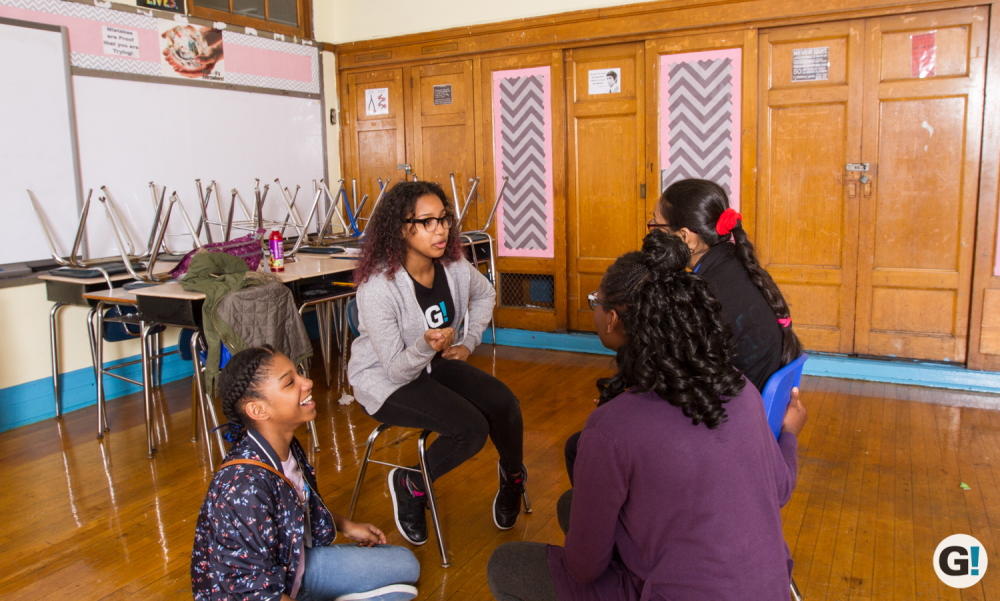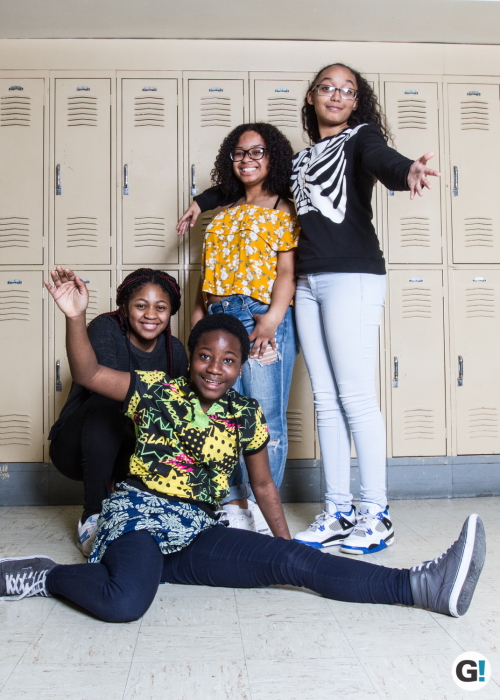
Photos by Lani Lee
Girl Be Heard after-school students from Middle School 118 in the Bronx talk.
Some of the biggest names in arts and entertainment sing the praises of an innovative New York City after-school program.
Girl Be Heard (GBH) harnesses the power of performance to activism, promoting racial, gender and economic empowerment. It’s also a mentoring program that provides its students with strategies to overcome obstacles.
In a promotional video for the program, the multihyphenate creator of the juggernaut “Hamilton,” Lin-Manuel Miranda, said he was inspired by their performances.
“I had my world rocked by these amazing, talented young women,” he says on the video. International superstar Alicia Keys echoes the sentiment, saying these girls can change the world: “I’m so proud to support Girl Be Heard because it builds future leaders through arts and storytelling. Art inspires people and reminds them how to get in touch with themselves.”
GBH offers its free “girl power curriculum” in after-school programs at Title 1 middle and high schools that serve free lunch in New York City. Executive Director Chiwoniso Kaitano said that curriculum begins with investigation of issues of identity.
“We give them tools to do their own self-analysis and through the process of getting to know yourself, you get to know how you respond to the world around you,” Kaitano said. “That leads to growth … growth in a way that helps you move forward not only in your own life, but also growth in a way that leads you to think about your community.”
Global + personal issues
The activism aspect of the program happened organically, she said.
“What makes GBH different is that we use the social justice angle. Our participants bring these issues up. They’re things they may be experiencing in their own lives and our role is just to guide their thinking around these issues. Of course, right now we’re having discussions about racial justice and how it affects black and brown communities. They’re becoming aware of how sometimes unfair the world can be, but also how they can feel empowered to change things,” she said.

A Girl Be Heard group from Hostos-Lincoln Academy of Science in the Bronx, which serves grades six through 12, happily poses.
The girls create performances about not only global and national issues such as immigration, gun violence and women’s rights, but personal issues including body image, suicide and teen pregnancy. GBH mentors guide the young performers through exploring these issues and help the girls overcome them.
Sandrine Dupiton, GBH director of education and human potential, called their efforts an “empowerment program.”
“We support our participants in finding their voice and then use it to create,” she said. The most important aspect of the program is to provide a safe space for girls to share their opinions and learn things that aren’t necessarily being taught in schools.
“We were talking about depression and how girls of color are more likely to be depressed,” said seventh grader Persephone Leonte in a video on the GBH website. “When young girls speak about that, you’re like, ‘Oh, I’m not the only person dealing with it.’”
Kaitano said she is still waiting to learn the final enrollment for fall. Before COVID-19 struck, about 400 students were enrolled in GBH’s after-school program.
While GBH has faced some challenges and uncertainty this year, there has been a silver lining during quarantine, she said. When the program pivoted to an all-digital platform in the spring, it was able to reach more students with broader interests. Now, GBH is exploring adding playwriting and screenwriting to its curriculum.
Kaitano is excited about Girl Be Heard’s 10-year strategic plan to expand the programs globally. It already has a program in Trinidad and Tobago and is considering adding curriculum in other countries such as Zimbabwe, South Africa, Jamaica and the Dominican Republic.
In addition to the after-school program, Girl Be Heard has a traveling theater company for girls and young women ages 12 to 21. It has performed for audiences from the United Nations to the White House.
Many GBH alumni are successful. One is currently attending college at Harvard and another is the 2019 Youth Poet Laureate for the United States. Some have organized Black Lives Matter protests and others have become advocates for their communities.
But Kaitano said fanfare and recognition is not what GBH is all about. “Our goal is to get the girls to any outcome to which they consider themselves a success. We want them to be leaders in their own lives. To feel like they have the power to make positive decisions on behalf of themselves — not just their communities.”





























